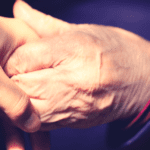The COVID-19 (novel severe acute respiratory syndrome coronavirus 2 – SARS -CoV2) pandemic has had a brutal impact on human life and health across the world, with the only current hope of reprieve lying in the development of an effective vaccine. As a result, there is widespread urgent research underway to identify a suitable candidate.
If many members of the public have concerns about the ethics of vaccination, it could be a serious public health problem.
There is no doubt that vaccination can be an effective public health strategy to curb the spread of infection. We each have a God-given immune system that constantly protects us against infections. As we are exposed to a disease, our immune system naturally works to both defeat it and provide us with immunisation against a future attack. However, diseases such as COVID-19 can be life-threatening or leave us with serious health problems. Vaccination can help us avoid or reduce severity of future infection. Vaccines contain killed or weakened (attenuated) viruses or bacteria (or portions of them) to trigger our immune systems to respond and develop immunity to that disease, without having to actually experience it.
This paper does not in any way question the value of widespread immunisation against serious diseases. However, for an immunisation program to be successful, a large majority of the population (usually 85-95% depending on the infection) must be vaccinated in order for ‘herd immunity’ to be reached, indicating that vulnerable members of the population will have minimal exposure to the infection. Therefore if many members of the public have concerns about the ethics of vaccination, it could be a serious public health problem.
Vaccines Using Fetal Cells
The World Health Organisation (WHO) maintains a ‘Draft landscape of COVID-19 candidate vaccines’[1] document on its website which tracks current research. At the time of writing, 169 vaccines were listed on the WHO website, of which 30 have progressed to clinical trials (which are required to assess the dosage, efficacy and safety of the vaccine in humans). Four leading candidate vaccines are manufactured using cells derived from human fetuses electively aborted decades ago. These are:
- AstraZenica/Oxford University, using a non-replicating viral vector; and derived from aborted girl’s kidney cell line HEK-293.
- CanSino Biological Inc./Beijing Institute of Biotechnology, using a non-replicating viral vector; derived from fetal cell line HEK-293.
- Moderna/NIAID, using mRNA and fetal cell line HEK- 293.
- Inovio Pharmaceuticals, using DNA and fetal cell line HEK-293.
Four leading candidate vaccines are manufactured using cells derived from human fetuses electively aborted decades ago.
The fetal cell line HEK-293 is a kidney cell line widely used in research and industry that comes from a fetus aborted in the 1960s, developed in the laboratory of molecular biologist Alex van der Eb at Leiden University around 1972. The use of fetal tissue from elective abortions is commonplace in pharmaceutical and medical research, and associated with commercial interests in abortion clinics. Several recommended vaccines for childhood immunisation utilise cell lines that were derived from fetal tissues harvested from elective abortions in the 1960s. The issue has come to the fore at the present time because one of the unethical vaccines, under development at Oxford University, has been targeted by the Australian Prime Minister for possible use in this country. His government has been in preliminary discussions with the pharmaceutical company AstraZenica, to negotiate a deal for 25 million doses of vaccine, should it prove to be safe and effective.
Cell lines are defined populations of cells that can be maintained in culture for an extended period of time. The cells in these lines have gone through multiple divisions before they are used in vaccine manufacture. The cells are used to generate the attenuated viruses used for immunisation. After manufacture, the vaccines are removed from the cell line and purified. No cells from the original abortion are contained in the final vaccine.
Moral Questions
While some may see no ethical problem here, for others a straight line can be drawn from the ending of a human life in an abortion to a vaccine created using cells derived from the harvesting of the fetal tissue. Despite the cells having been propagated for years in the laboratory far removed from the abortion, for some that connection line remains. My own view is that the key consideration in whether using a vaccine which is manufactured using tissue from an aborted fetus is licit or immoral is whether there is material cooperation with the evil act of abortion. If the abortion were conducted in order to harvest tissues that were to be used for the vaccine, then it would clearly be immoral. But in the case of the COVID-19 vaccines created from the HEK-293 cell line, the abortion was carried out for other reasons, and the tissue was acquired after the child’s death for the purpose medical research. The use of the vaccine now will not promote further abortions for this particular purpose. It can therefore be argued that we are not morally complicit with the original abortion.
If the only available organ for a life-saving transplant is donated by a murder victim, we do not consider that in accepting the organ we are approving of murder.
Another way to consider this situation is to compare it with organ transplant. If the only available organ for a life-saving transplant is donated by a murder victim, we do not consider that in accepting the organ we are approving of murder. In the same way, if we have no alternative to a certain vaccine produced using tissue derived from children killed over 50 years ago, we are not necessarily condoning abortion.
Many advances in medical science have been based on information derived from evil origins. Nazi experimentation on humans during the second World War led to knowledge which informs modern orthopaedics, for example. While never condoning evil acts so that good may result, the Bible teaches of a loving God who seeks to make good out of evil. Though linked, participation in the good does not endorse the evil.
Additional Obligations
It could be argued that to refuse vaccination (in the event that only an unethical COVID 19 vaccine were available) would also be wrong as it increases the risk of prolonging the pandemic and is not a loving way to treat our neighbour. When comparing the competing ethical obligations of avoiding the vaccine in view of the wrong done in the past or refusing to protect the vulnerable in society today, it could be argued that the latter is the more immediate responsibility.
It could be argued that to refuse vaccination would also be wrong as it increases the risk of prolonging the pandemic and is not a loving way to treat our neighbour.
However, trade in human fetal remains persists in our society. Ethical alternatives are available for scientific research. Christians should continue to oppose use of fetal tissue from aborted children as it is inconsistent with human dignity.
We need to remember that in the current situation of COVID19, there are many ethical vaccines also in development. It is therefore much too early to call a moratorium on vaccination, even for those with ethical concerns. And even the Vatican, probably the most vocal opponent over the years, has permitted use of vaccines generated from fetal tissue of elective abortions on a temporary basis, in the interests of protecting the vulnerable, until an ethical alternative is available.[2]
Conclusion
Christians should call on the government to provide access to a vaccine that is produced ethically, should such a vaccine become available: no Australian should be forced to choose between being vaccinated against this potentially deadly virus and violating his or her conscience.
In the absence of an ethical vaccine, Australian Christians should submit to vaccination on grounds of loving their neighbour, and contributing to the public good. Even though an ethical vaccine is preferred, the remoteness of the evil which led to the fetal cell line makes it more important to avoid the evil of contributing to further spread of the COVID-19 virus.
Regardless of the method of manufacture for the vaccine eventually available to Australians, Christians should continue to call for ethical production of all vaccines and a ban on future scientific research which utilises fetal cells derived from elective abortion in efforts to halt the trade of human remains.
[1] https://www.who.int/publications/m/item/draft-landscape-of-covid-19-candidate-vaccines accessed 25 August 2020.
[2] 2019. Pontifical Academy for Life Statement: Moral Reflections on Vaccines Prepared from Cells Derived from Aborted Human Foetuses. The Linacre Quarterly. doi:10.1177/0024363919855896















